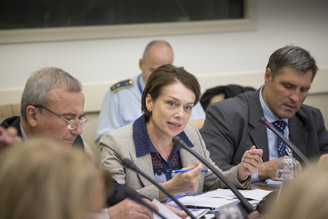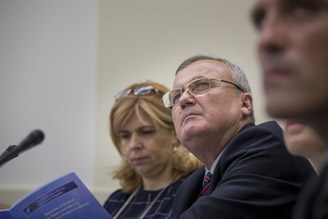NATO and Ukraine strengthen scientific cooperation
The current security crisis in Ukraine is not only affecting regional and Euro-Atlantic security. It has also impacted scientific infrastructure and education institutes in the country. Through NATO’s Science for Peace and Security (SPS) Programme, the Alliance is engaging Allied and Ukrainian scientists and experts in practical cooperation, forging research networks and supporting capacity building in the country. Ideas to strengthen such support were identified at a meeting of the NATO-Ukraine Joint Working Group on Scientific and Environmental Cooperation at NATO Headquarters on 18 September 2015.


The ongoing crisis has left its mark on the national scientific infrastructure and research networks in Ukraine, which has led to 26 universities and institutes, along with 12,000 university lecturers and researchers being re-located from occupied territories to other parts of Ukraine. But most of the infrastructure, including libraries and laboratories, remain inaccessible in parts of eastern Ukraine. In Crimea alone, nine large research institutes were lost, including an important research fleet located in Sevastopol, according to the Vice-President of the Ukrainian National Academy of Sciences, Sergiy Komisarenko.
“Only international cooperation can help us to solve these problems,” said Maxim Strikha, the Ukrainian Deputy Minister for Science and Education, who headed up the high-level delegation from Ukraine and co-chaired the meeting of the Joint Working Group along with the Senior SPS and Partnership Cooperation Advisor, Dr Deniz Beten. “We are very grateful for the real, practical support from NATO, and we are proud that we are now the first beneficiary of the SPS Programme,” Mr Strikha added.
Ukraine has been engaged in the SPS Programme since the mid-1990s. In response to the Ukraine crisis and following the guidance provided by Allied foreign ministers in April 2014, scientific and technological cooperation with Ukraine was boosted significantly. With 16 new SPS activities launched in 2014 and nine projects and workshops approved so far in 2015, Ukraine has become by far the largest beneficiary of the SPS Programme.
Addressing current threats

Today, cooperation addresses a wide range of security areas, including new threats. “We now have projects in the areas of cyber defence, energy security, and defence against chemical, biological, radiological, nuclear agents,” said NATO Assistant Secretary General for Emerging Security Challenges Sorin Ducaru. “SPS activities address priority areas for cooperation with Ukraine and help our partner to deal with the effects of the current crisis. These include for example a hands-on cyber defence training course that took place earlier this year, as well as a project to provide training and equipment to support humanitarian de-mining in eastern Ukraine.”
This project, which had been developed in coordination with the State Emergency Service of Ukraine, kicked off in June this year and will provide equipment and training to Ukrainian deminers. This will enable Ukraine to detect and clear landmines and booby-traps in parts of eastern Ukraine, allowing the local population to safely return to their homes.
Ukraine recently also joined a major SPS project to develop a multinational telemedicine system for emergency situations. Once completed, this system will allow medical specialists to engage in major disasters and incidents, both of military and civilian nature, that require specified medical expertise. NATO Secretary General Jens Stoltenberg attended a demonstration of this capability on 21 September 2015, during a field exercise organised by the Euro-Atlantic Disaster Response Coordination Centre, in Lviv, Ukraine.
The meeting of the Joint Working Group identified a number of areas for potential future SPS cooperation.
Established in May 2000, the group has since met on a regular basis. This year, in addition to the Deputy Minister of Education and Science of Ukraine and the Vice-President of the National Academy of Sciences of Ukraine, the Ukrainian delegation included the heads of the Ukrainian parliament’s Committees for Science and Education and for Health Care, and the Advisor to the President of Ukraine on Humanitarian Issues.
